Select Works of Joseph Blenkinsopp (9 vols.)
Digital Verbum Edition
Overview
With these nine volumes, Joseph Blenkinsopp opens up new windows of insight into biblical texts. A well-known Old Testament scholar and professor emeritus at the University of Notre Dame, Blenkinsopp’s special focus is on the Pentateuch and the Old Testament Prophets. Blenkinsopp contributed three volumes on Isaiah to the prestigious Anchor Yale Bible, and contributed an introduction to the Pentateuch to the Anchor Yale Reference Library. This collection contains each of those volumes, as well as an extensive commentary on the Primeval History in Genesis, the first phase of Judaism, and much more. Bible scholars will find Blenkinsopp’s analysis and insights indispensable to their studies of the Old Testament.
In the Verbum editions, these volumes are enhanced by amazing functionality. Important terms link to dictionaries, encyclopedias, and a wealth of other resources in your digital library. Perform powerful searches to find exactly what you’re looking for. Take the discussion with you using tablet and mobile apps. Your software brings the most efficient and comprehensive research tools together in one place, so you get the most out of your study.
This collection is part of the Modern Catholic Authors Bundle (243 vols.).
Key Features
- Offers fresh insights from a renowned Old Testament scholar
- Provides in-depth analysis of Old Testament texts
- Discusses the significance, formation, background, and authorship of biblical texts
Product Details
- Title: Select Works of Joseph Blenkinsopp
- Author: Joseph Blenkinsopp
- Volumes: 9
- Pages: 2,956
- Christian Group: Catholic
- Resource Type: Bible Studies, Monographs, Collected Works, Commentaries
- Topic: Biblical Studies
Individual Titles
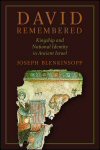
David Remembered: Kingship and National Identity in Ancient Israel
- Author: Joseph Blenkinsopp
- Publisher: Eerdmans
- Publication Date: 2013
- Pages: 231
Joseph Blenkinsopp traces the development of traditions about David in the collective memory of the people of Israel and the first Christians, from the extinction of the Davidic dynasty in the sixth century BC to the early Christian church.
This is neither a biography of David nor an exegetical study of the biblical narrative about David. Rather, it focuses on the memory of David as a powerful factor in the formation of social identity, in political activity (especially in reaction to imperial rule), and in projections of the future viewed as the restoration of a never-forgotten past.
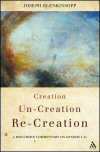
Creation, Un-creation, Re-creation: A Discursive Commentary on Genesis 1-11
- Author: Joseph Blenkinsopp
- Publisher: T&T Clark
- Publication Date: 2011
- Pages: 232
Joseph Blenkinsopp provides a new commentary on Genesis 1–11, the so-called “primeval history” in which the account of creation is given. Blenkinsopp argues that, from a biblical point of view, creation cannot be restricted to a single event, nor to two versions of an event, as depicted in Genesis 1–3. Rather, it must take in the whole period of creation arranged in the sequence of creation, uncreation, and recreation as see in Genesis 1–11.
Through the course of the commentary, presented in continuous discussion rather than in a rigid verse-by-verse form, Blenkinsopp takes into account premodern interpretations of the texts, especially in the Jewish interpretative tradition, as well as modern, historical-critical interpretations. While Blenkinsopp takes into account reconstructions of the text’s sources, he analyzes its canonical form, enabling him to focus upon the literary structure and theological message of this section of Scripture as a whole.
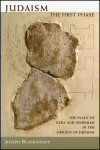
Judaism, the First Phase: The Place of Ezra and Nehemiah in the Origins of Judaism
- Author: Joseph Blenkinsopp
- Publisher: Eerdmans
- Publication Date: 2009
- Pages: 288
Most studies of how early Judaism related to the non-Jewish world and how others perceived it start no earlier than the Hellenistic period. Joseph Blenkinsopp argues that we must go further back to the Babylonian destruction of Jerusalem and its temple and the liquidation of the political and religious infrastructure—monarchy, priesthood, scribalism, prophecy—that had sustained the Judean state for centuries. Judaism, the First Phase is a fresh—and potentially stunning—look at Jewish origins, tracing the legacy of Ezra and Nehemiah.
. . . presented with typical clarity, incisiveness, and breadth of scholarship. No student of early Judaism will fail to learn much from the numerous insights of this book. Blenkinsopp’s unique combination of wide learning and elegant argumentation makes his scholarship pleasurable as well as instructive.
—Philip R. Davies, professor of biblical studies, University of Sheffield
Blenkinsopp’s profound knowledge of biblical (and related) texts and their potential interrelationships is displayed prominently throughout the volume. The combination of thoughtful detailed analysis and an approach in which the ‘big historical picture’ is always at the center ensures that this book will be widely read and cited both by historians of the period and by scholars researching particular texts relevant to the period.
—Ehud Ben Zvi, professor, University of Alberta
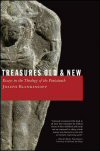
Treasures Old and New: Essays in the Theology of the Pentateuch
- Author: Joseph Blenkinsopp
- Publisher: Eerdmans
- Publication Date: 2004
- Pages: 238
The Pentateuch is one anchor of the Western religious heritage, a rich source of theological and spiritual instruction that can be plumbed again and again. In Treasures Old and New, accomplished biblical scholar Joseph Blenkinsopp engages several interesting topics in dialogue with texts from the Pentateuch.
In keeping with the view that the Pentateuch is far too multiplex to be encapsulated in a single theological system, Blenkinsopp has written Treasures Old and New as a “sketchbook” of theology in the Pentateuch. This fruitful approach allows him to consider themes that easily fall through the cracks of more systematic works of biblical theology. Among the many subjects that Blenkinsopp pursues are the role of memory in the construction of the past, the dependence of Christianity on Judaism, the close connection between sacrifice and community in Old Testament Israel, the proper meaning of human stewardship of the world, and belief (or lack of belief) in a meaningful postmortem existence.
Blenkinsopp explores well-known texts from less well-known angles. The Garden of Eden story, for example, gains in resonance when read together with Gilgamesh, and the laws governing diet and cleanliness become clearer in the light of current ecological concerns. Readers will also learn from Blenkinsopp’s novel approach to such important yet enigmatic stories as the Creation, Cain and Abel, the Flood, the Tower of Babel, the Call of Abram, and Sodom and Gomorrah.
Blessed with an extraordinary ability to transmit complex issues in concise and lucid fashion, Blenkinsopp shows that serious engagement with biblical texts, while sometimes demanding, can be intellectually and religiously rewarding.
This erudite, instructive, and engaging collection of essays brings much fresh insight to the biblical text. [It] offers many rewarding and instructive insights.
—Association of Jewish Libraries Newsletter
Of the great biblical interpreters of our age, no one can emulate Joseph Blenkinsopp’s scholarship. He brings to the biblical text not only a huge range of knowledge and interests but also sharp perception and shrewd judgment. Above all, again and again he gets to the heart of the issue—a critical engagement with the text and with its authors. These essays demonstrate the best of his work, which is original, profound, and always fresh.
—Philip R. Davies, professor of biblical studies, University of Sheffield
I strongly recommend this book to all those who remember the biblical stories of their childhood and youth and are interested in taking a fresh journey into humanity’s past with an intrepid, engrossing guide.
—David Noel Freedman, author and editor
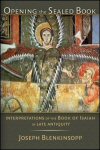
Opening the Sealed Book: Interpretations of the Book of Isaiah in Late Antiquity
- Author: Joseph Blenkinsopp
- Publisher: Eerdmans
- Publication Date: 2006
- Pages: 335
Of all the texts in the Hebrew and Christian Scriptures, perhaps no book has a more colorful history of interpretation than Isaiah. A comprehensive history of this interpretation between the prophet Malachi and the first days of Christianity, Joseph Blenkinsopp’s Opening the Sealed Book traces three different prophetic traditions in Isaiah—the “man of God,” the critic of social structures, and the apocalyptic seer.
Blenkinsopp explores the place of Isaiah in Jewish sectarianism, at Qumran, and among early Christians, touching on a number of its themes, including exile, “the remnant of Israel,” martyrdom, and “the servant of the Lord.” Encompassing several disciplines—hermeneutics, the Dead Sea Scrolls, Second Temple studies, Christian origins—Opening the Sealed Book will appeal to Jewish and Christian scholars as well as to readers fascinated by the intricate and influential prophetic visions of Isaiah.
This wide-ranging and original book probes the interpretation and use of the book of Isaiah in Second Temple Judaism and the New Testament. An impressive and stimulating contribution to the early history of biblical interpretation.
—John J. Collins, Holmes Professor of Old Testament, Yale University
Joseph Blenkinsopp brings his enormous learning to the use of the book of Isaiah in a later generation of Jewish and Christian reading. This important book makes two immense contributions to our learning. . . . it greatly illuminates our historical understanding of formative Jewish and Christian communities in their use of Scripture . . . it makes clear how relentlessly pluralistic is our long-term reading of Scripture that resists any single reductionist reading.
—Walter Brueggemann, professor emeritus, Columbia Theological Seminary
Blenkinsopp not only explores the history of Isaiah’s reception in early Judaism and Christianity but also uncovers the numerous links between the figure of the prophet (and his book) and Jewish apocalyptic and sectarian movements, including Christianity itself. A brilliant and largely convincing synthesis by a scholar renowned for the depth and range of his learning.
—Philip R. Davies, professor of biblical studies, University of Sheffield
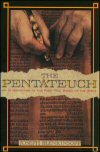
The Pentateuch: An Introduction to the First Five Books of the Bible
- Author: Joseph Blenkinsopp
- Publisher: Yale University Press
- Publication Date: 2000
- Pages: 288
The Pentateuch (its Greek name, but also known as the Torah by the Hebrews) consists of the first five books of the Bible: Genesis, Exodus, Leviticus, Numbers, and Deuteronomy. From Adam and Eve in the Garden, to Noah's Ark, to Moses' parting of the Red Sea, to its conclusion with the death of Moses, the Pentateuch contains some of the most important and memorable stories in Western civilization. In this richly detailed work, which has become a standard in the field, renowned biblical scholar Joseph Blenkinsopp unravels (as Harold Bloom did in The Book of J) the radical scholarly opinions on just where these ancient and powerful stories come from, how they were formed, and what significance they have today. In the classroom, when professors cover these books of Moses, they turn to Dr. Blenkinsopp's classic for reliable, accessible discussions of all the important details.
All mature students of the Bible—scholarly and lay, Jewish, Christian, and secular alike—can profit richly from his learned and elegant discussion.
—Jon D. Levenson, Albert A. List Professor of Jewish Studies, Harvard University School of Divinity
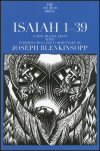
The Anchor Yale Bible: Isaiah 1–39
- Author: Joseph Blenkinsopp
- Series: Anchor Yale Bible (AYB)
- Publisher: Yale University Press
- Publication Date: 2000
- Pages: 544
Writing a commentary on the book of Isaiah in the middle of a paradigm shift in biblical studies, and in the study of the prophetic books in particular, is no easy task. The book of Isaiah has been the object of more scholarly interest over the past two or three decades than during the preceding century. At the same time, much of the received wisdom on the formation of the book has been called into question, including such matters as the date of its several components, the standard tripartite division, the role (if any) to be assigned to the prophet Isaiah himself, and the passages dealing with the anonymous Servant of the Lord. A great deal of effort has been, and continues to be, expended in exploring new approaches to the book, both within the conventional critical methodologies and beyond them.
This commentary by Joseph Blenkinsopp on the first 39 chapters of the book, the first of a three-volume commentary on Isaiah, is written from a critical perspective in the belief that only in this way can these texts be given the opportunity to say what they have to say—and also in the conviction that what they have to say still retains its transforming power for those willing to listen attentively today. The result is a commentary of unequaled brilliance and insight that will stand as the definitive study of one of the Hebrew Bible’s most compelling and elusive books.
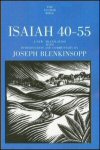
The Anchor Yale Bible: Isaiah 40–55
- Author: Joseph Blenkinsopp
- Series: Anchor Yale Bible (AYB)
- Publisher: Yale University Press
- Publication Date: 2002
- Pages: 432
Scholars have traditionally isolated three distinct sections of what is known as the book of Isaiah, and in Isaiah 40–55, distinguished biblical scholar Joseph Blenkinsopp provides a new translation and critical commentary on the section usually referred to as Second or Deutero Isaiah. The second volume in a three-volume commentary, it easily maintains the high standards of academic excellence established by Isaiah 1–39.
Second Isaiah was written in the sixth century BC, in the years just before the fall of the mighty Babylonian Empire, by an anonymous prophet whom history has erroneously identified with the real Isaiah (born ca. 765 BC). Scholars know Second Isaiah was written by someone other than Isaiah because the contexts of these prophecies are so very different. When Second Isaiah was written, the prophet believed that Israel’s time of suffering was drawing to a close. There was, he insisted, a new age upon them, a time of hope, peace, and renewed national prosperity. The main thrust of the prophet’s argument was intended to rally the spirits of a people devastated by war and conquest. One of the most famous examples of this optimistic tone is the well-known and beloved “Song of the Suffering Servant,” which is found in chapters 52–53, and about which Blenkinsopp has some challenging new ideas.
The final chapters of Second Isaiah, however, are in an entirely different key as it becomes clear that the new world the prophet foresaw earlier was not going to come to pass. This despair finds its most poignant expression in the final section of the book of Isaiah, addressed in the third volume, also included in this collection.
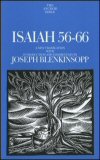
The Anchor Yale Bible: Isaiah 56–66
- Author: Joseph Blenkinsopp
- Series: Anchor Yale Bible (AYB)
- Publisher: Yale University Press
- Publication Date: 2003
- Pages: 368
The world’s leading authority on the prophet Isaiah brings his distinguished three-volume commentary on the book of Isaiah to a conclusion with this new translation and critical discussion of the final 11 chapters.
The concluding section of the book of Isaiah, sometimes referred to as Third or Trito Isaiah, had a profound impact on the Christian movement in its formative phase, including such central issues as the identity of the founder, the profile of the disciple, and the gentile mission. In this thorough and informative commentary, Joseph Blenkinsopp shows that while these chapters maintain continuity with Second Isaiah, they must be considered in the light of a new set of circumstances.
The texts present a community beset by severe problems, attempting to cope with disappointed expectations and trying to maintain its faith in the reality, power, and benevolence of the God of traditional religion. Blenkinsopp discusses in detail the issues that divide the community, from concerns about the efficacy of religious practices (prayer, fasting, Sabbath observance, and sacrifice) to questions about who may claim the name of Israelite and under what conditions, to what kind of relations should be maintained with outsiders. In examining each of these topics, Blenkinsopp shows that they provide evidence of an emerging Judaism seeking its own identity and self-definition and testify to the existence of a prophetic discipleship inspired by the person and teaching of the charismatic servant whose fate is described in the previous section of Isaiah.
Reflecting the same standard of excellence as Blenkinsopp’s first two volumes on Isaiah, this is an important contribution to the prestigious Anchor Yale Bible.
About Joseph Blenkinsopp
Joseph Blenkinsopp is John A. O’Brien Professor Emeritus of Biblical Studies at the University of Notre Dame in Indiana. He is also the author of Opening the Sealed Book: Interpretations of the Book of Isaiah in Late Antiquity, Interpretation: A Bible Commentary for Teaching and Preaching Ezekiel, and Treasures Old and New: Essays in the Theology of the Pentateuch.
This collection is part of the Modern Catholic Authors Bundle (243 vols.).
Key Features
- Offers fresh insights from a renowned Old Testament scholar
- Provides in-depth analysis of Old Testament texts
- Discusses the significance, formation, background, and authorship of biblical texts
Product Details
- Title: Select Works of Joseph Blenkinsopp
- Author: Joseph Blenkinsopp
- Volumes: 9
- Pages: 2,956
- Christian Group: Catholic
- Resource Type: Bible Studies, Monographs, Collected Works, Commentaries
- Topic: Biblical Studies
About Joseph Blenkinsopp
Joseph Blenkinsopp is John A. O’Brien Professor Emeritus of Biblical Studies at the University of Notre Dame in Indiana. He is also the author of Opening the Sealed Book: Interpretations of the Book of Isaiah in Late Antiquity, Interpretation: A Bible Commentary for Teaching and Preaching Ezekiel, and Treasures Old and New: Essays in the Theology of the Pentateuch.